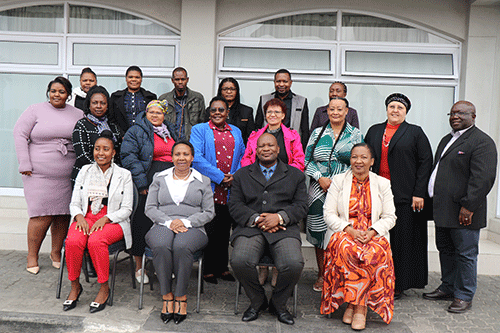George Sanzila
SWAKOPMUND – The Sexual Reproductive Health Rights, HIV and AIDS Governance project launched in 2019 has ended, with many stakeholders lauding the successes. The project was launched by the Speaker of the National Assembly, Prof Peter Katjavivi.
The secretary general of the SADC-PF, Boemo Sekgoma, extolled stakeholders at the recent review meeting aimed at taking stock of successes and challenges, and mapping the way forward. She noted that the project has been successfully implemented, despite impediments such as Covid-19 which disrupted activities conducted such as workshops, round-table meetings and oversight visits.
“I would like to congratulate the parliament of Namibia, in particular the Office of the Hon. Speaker, the Office of the Clerk, as well as Hon. Members led by Hon. Gothard Kasuto and the SRHR Researcher, who have driven the SRHR Project to fruition over the last four years. Despite competing parliamentary schedules and initiatives, and despite the upsurge of the Covid-19 pandemic, I am pleased to share that most project activities under the SRHR project have been successfully completed,” said Sekgoma.
She added that the project transcends sexual rights, and that it also encompasses democratic accountability and the implementation of human rights, among many other virtues. “The SRHR project is not only a sexual rights project, it is also a project on good governance, democratic accountability, and implementation of human rights amongst others. It brings to the fore issues which are fundamental to democracy such as the rule of law, separation of powers, constitutionalism, and stirs debates around those themes in view of stimulating democratisation,” noted the secretary general.
While informing stakeholders about a six-months extension of the project that has just been approved by the donors, Sekgoma implored lawmakers to use the review meeting to identify areas needing improvement in order to properly prepare for the extension and the envisaged third phase of the project. “The exercise of introspection will feed into the forum’s process of applying for a new project with its donor, Sweden, and will also assist the national parliament to identify any areas where there is room for change or improvement,” she stated.
The chairperson of the SRHR Technical Working Group and the Standing Committee on Gender Equality, Social Development and Family Affairs, Kasuto, thanked all stakeholders and reminded them of their sacred duties to champion and advocate for SRHR issues. “I wish to thank my fellow MPs, the technical working group, the SG and all stakeholders. It is your efforts that contributed to achieving the project’s objectives. Some of you have been there since the inception of the project in 2014. As MPs, we were encouraged to strengthen, champion and advocate for SRHR and HIV/AIDS issues through the enactment of laws, motions and motivation for budgetary allocations,” he noted. Kasuto said since the start of the project, numerous motions and petitions have been dealt with by the Namibian Parliament, including public hearings on the legalisation and non-legalisation of abortion, and petitions by feminists’ movements, the Namibia Trust and Shut it All Down movement on the protection of the rights of marginalised groups. The chairperson added that many SRHR challenges still need to be tackled such as violence and exploitation, teenage pregnancies, baby dumping, child marriages and HIV/AIDS.
The second phase of the Southern African Development Community Parliamentary Forum (SADC PF)-initiated project ran for a period of four years from 2019 to 2023. As a result, the SADC-PF and the National Assembly signed a Memorandum of Understanding to implement the project, funded by the Swedish government to the tune of US$3.2 million.
It culminated from a resolution during an assembly session of the SADC-PF in 2007 in Malawi that has bound Parliaments to address SRHR issues at both national and regional levels. The project seeks to sensitise individuals on choices regarding their sexuality and reproductive health rights despite their age, gender or HIV status. At the legislative level, the aim is to introduce motions and scrutinise bills in Parliament which seek to address issues of sexual reproductive health rights. Some of the reports emanating from investigative visits have already been tabled in parliament for discussion and further action.
It is being implemented in 14 SADC countries – including Namibia – which have continued to grapple with sexual reproductive health rights challenges, with mostly women and girls at the receiving end.
Key parliamentary committees identified to champion these issues include the Parliamentary Standing Committee on Gender, Social Development and Family Affairs; and the Parliamentary Standing Committee on Human Resources and Community Development.
Previously, Namibian Members of Parliament visited various regions in the country to ascertain the conditions of state health facilities and look at issues of reproductive health, including HIV and AIDS in general. This was done in partnership with the expertise of civil society organisations.
During the first phase of the project, Namibia recorded many successes, despite the country having only joined the project towards the end of 2016.


